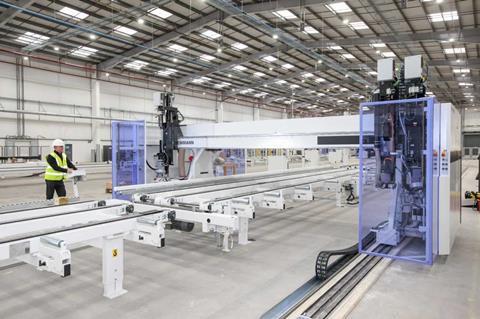Boss of partnerships housebuilder blames poor performance on too rapid expansion and modular facilities
Partnerships housebuilder Countryside is cutting staff and reviewing “all options” for its new modern methods of construction (MMC) factories after a review of the business found the firm had failed to manage recent rapid expansion.
Countryside said in an update to the City this morning it was merging two unprofitable regional businesses in with neighbouring regions and was “lowering the cost base” of the business at regional and group level, after encountering operational problems in the North and failing to realise the benefits of the 2018 acquisition of Westleigh.
Countryside’s statement follows a profit warning by the business in early January, which prompted the departure of chief executive Iain McPherson, and a full site-by-site review of the business by the chairman, John Martin.
The business, which only last autumn made its investment in modular manufacturing facilities the centrepiece of its net zero housing strategy, said that “excess manufacturing capacity” had been created and “the Board is considering all options to minimise losses”.

Countryside has for a number of years produced fully formed, closed panel timber frame homes in two manufacturing facilities in Warrington, but has more recently invested £20m in a new timber modular factory in Bardon, Leicestershire, opened in June last year. Launching its net zero strategy last November, it said: “We firmly believe that adopting MMC, such as modular timber frames, is key to delivering homes at scale, pace and quality, while ensuring more sustainable outcomes.”
But today’s statement said: “There is now significantly more [manufacturing] capacity than the Group is able to utilise and management is reviewing the facilities in order to align capacity with the expected future needs of the business.”
It added that the business had incurred net costs of £6.1m from manufacturing in the first six months of the year, £2.8m of which related to the new facility in Bardon.
In total, it said, it expected the manufacturing business to make an operating loss of around £10m over the whole of the financial year to September.
“The Board is considering all options and will act quickly to minimise losses arising from manufacturing,” the statement said.
However, the issues with the manufacturing business were just one part of the problems identified in the review, which said that performance in the north had been impacted as large scale schemes had completed, and follow-up projects had been delayed.
It said: “On a number of sites, progress was disrupted by the failure of some groundworkers, timber-frame and roofing contractors to deliver to the required quality and in the required timeframe. In addition, profitability was impacted by an escalation in costs to complete in certain sites.”
It added that the operations acquired with the purchase of partnership builder Westleigh, which operated in the Midlands and South Yorkshire, had not performed well, having “very low” margins which had declined towards the end of projects.
The South Midlands and Chilterns regions are to be merged with neighbouring regions, with the South Midlands business “unprofitable”. Overall the business said: “In other regions the Group had planned to expand rapidly. It is now apparent that the Group could not manage expansion at this rate, particularly due to the constraints of the supply chain.”
At a group level, the business said it was looking to spend £8m on restructuring the business to lower costs, which it said would reduce costs annually by around £15m, with staff consultation to take place throughout April and May. It did not say how many staff will be affected by the changes.
Countryside may also be forced to write-down the value of goodwill assets acquired with the Westleigh purchase, it said, and might need to write down £20m-£25m in order to exit a site on which significant additional investment would be required for it to be developed.

Countryside chair said the business nevertheless retained a strong pipeline of opportunities and had performed well in the second quarter of its financial year, with adjusted revenue of £659m now expected for the first half of the year, down from £755m this time last year, but above the level seen in 2020.
Adjusted operating profit for the half year will be £45.6m, the firm said. The firm also said today that it will sign the government’s cladding remediation pledge.
John Martin, chair and interim CEO of Countryside, said: “Management has identified a number of areas where we can raise our game and our team is moving quickly to improve performance. There remains significant market demand for our homes and we did not identify any competitive issues during our review.
“Large parts of the group continue to perform strongly, building high-quality, affordable homes and developing places people love as a trusted partner of local authorities, registered providers and PRS investors.”

























No comments yet